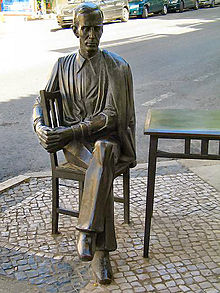Antonio Aleixo
António Fernandes Aleixo (born February 18, 1899 in Vila Real de Santo Antonio , Algarve , Portugal, † November 16, 1949 in Loule , Algarve, Portugal) was a Portuguese folk poet. He is considered one of the most important folk poets in Portugal in the 20th century, is now a very well-known figure in Portugal and has meanwhile become a cult figure . At the same time he is also known as the "homeland poet of the Algarve".
Life
António Aleixo worked in many professions: he worked as a construction worker, auxiliary policeman, ticket seller and shepherd. He had also worked in France for some time , which was nothing unusual for a simple Portuguese of his day. He was actually semi- illiterate , which means he could read but not write. Self-taught, he taught himself about writing and literature. The school teacher Joaquim Magalhaes, to whom he dictated the verses, helped him to write his verses - mostly quatrains . It was Magalhaes who took care of the publication of the verses.
He was also active as a folk singer and sang his own, but also strange folk tunes at the numerous annual fairs in the Algarve, where he became known to a wider audience.
Due to a tuberculosis disease, he first spent the last years of his life in a sanatorium in Coimbra and then went back to the beloved Algarve, where he died on November 26, 1949 at the age of only 50 from the effects of tuberculosis. One of his daughters had also died of tuberculosis. One of his grandchildren managed to become mayor of Loule.
Cult figure Aleixo
Magalhaes' teacher took care to examine and improve the grammar and orthography of the verses that Aleixo recited to him . It was also he who was looking for an editor and found one in the Algarve's cultural initiative (Circulo Cultural do Algarve) to support him. Aleixo's first volume with verses, published in 1943, sold 1,100 copies within a few days and made it famous throughout Portugal. The edition was completely out of print, Aleixo became known, especially because his poetry was easy to understand and he was built up as a representative of the common people. Especially people from simple professions - craftsmen, workers, fishermen, farmers, shepherds, small office workers - could identify with him and he became their role model, also for social advancement. Aleixo is particularly important internationally for people who want to learn the Portuguese language and who can train themselves in it through the verses that are easy to learn and understand.
His verses mostly contain a touch of irony and are almost all - more or less - strongly socially critical.
Through his literary work, which also made him write some popular plays that were successfully performed in theaters, he came into contact with the world-famous poet Miguel Torga . Torga and the sculptor Tosson became Aleixo's most prominent friends.
He is dear to today's youth and has become a cult figure, as many young people learn and recite his quatrains in school, at the same time he is a role model for many young poets.
Some honors were given after his death: in Paço de Arcos , Belo Horizonte ( Brazil ) and Albufeira streets bear his name, in Portimão in the Algarve and even in São Paulo , Brazil , schools were named after him, and in Loule, the city in which he was named Lived last, there is a memorial of the poet sitting at a table, its presentation is reminiscent of the famous monument to Fernando Pessoa in Lisbon . In 1995 a foundation named after the poet was established: “Fundação António Aleixo”, which tries to give children and young people in the Algarve a better life through social projects and culture.
A quatrain from Aleixo, translated into German, that shows how his poetry worked: “I know I seem like a thief / But I know many / They without appearing for what they are / They are what I am appear. "
plant
- Quando começo a cantar, 1943, poetry.
- Intencionais, 1945, popular piece.
- Auto da vida e da morte (Piece of Life and Death), 1948, Volksstück.
- Auto da curadeira, 1950, popular piece.
- Auto do Ti Jaquim - fragment of a folk piece, without a year.
- Este livra que vos deixo, 1969, complete works of poetry (posthumously).
- Ineditas, 1979, further texts (posthumously).
swell
- Page no longer available , search in web archives: cgalgarve.com
- Page no longer available , search in web archives: acaciosrubras.no.sapo.pt
- Poem from: Richtig Reisen - Dumont - Portugal, 1988, p. 271, box of poets and lottery sellers .
| personal data | |
|---|---|
| SURNAME | Aleixo, António |
| ALTERNATIVE NAMES | Aleixo, António Fernandes (full name) |
| BRIEF DESCRIPTION | Portuguese folk poet |
| DATE OF BIRTH | February 18, 1899 |
| PLACE OF BIRTH | Vila Real de Santo Antonio |
| DATE OF DEATH | November 16, 1949 |
| Place of death | Loule |
